Trey Parker and Matt Stone are clever filmmakers and inspired comedians, but I can’t help despising where they’re coming from politically in Team America: World Police (Paramount, 10.15), their R-rated puppet flick.
I’d love to fall in line with my journo friends and call them the cat’s meow in all respects, but man, I can’t. Matt and Trey are in league with the bad guys, or at the very least doing what they can to undermine the legitimate and (hello…?) insightful convictions of the anti-Bush lefties everywhere, so no offense but leaving aside the fact that they’re a couple of extremely funny dudes, they can both cram it sideways.
Let’s get the compliments out of the way first….
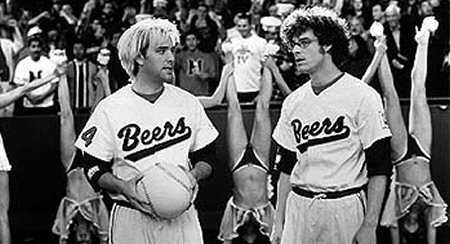
Matt and Trey really know how to sell a joke or a bit, and are clearly operating ahead of the curve. I was laughing pretty hard here and there when I saw Team America last weekend. It’s an appallingly funny film at times. It’s going to be a fairly big hit.
I never thought I’d find myself saying that a scene showing a drunken puppet repeatedly vomiting on a New York City sidewalk is a comic jewel, but Team America has such a scene and it’s a bona fide classic — right up there with the most celebrated comic bits of Laurel and Hardy, the Marx Brothers and Martin and Lewis.
< ?php include ('/home/hollyw9/public_html/wired'); ?>
In fact, it’s the best funny-vomiting scene to happen in American cinema over the last 40 years. The last truly remarkable scene in this vein was included in Arthur Hiller’s The Americanization of Emily in 1964. (There’s not much to it — just a bit with a young sailor on a ship heading for Omaha Beach on D-Day throwing up into a steel-pot helmet. The sound he makes while doing this is amazing.)
But I’m also ticked off, dammit, about what roughly half of the political jokes in Team America are saying deep down.
And what is that? Basically that showbiz liberals are pompous jerks with broom handles up their ass. It also implies righties aren’t quite as bad because the film doesn’t criticize them, so maybe it’s okay to vote for Bush.
I should acknowledge that none of the journalists and critics I’ve spoken to are taking the political content of this film even half-seriously. “I don’t agree with you…they’re just funny guys,” a journalist friend told me last Sunday. So maybe I should back off, lighten up, grow a sense of humor?
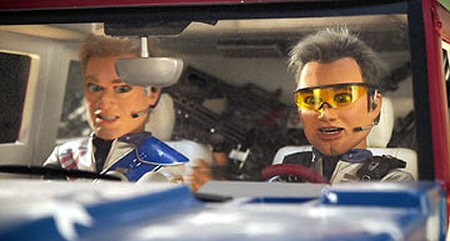
Parker and Stone have been telling journos all along that Team America is a goof on Jerry Bruckheimer-type action movies. “People are saying that [the film is] about politics,” Stone told Washington Post columnist Anne Thompson. “It’s a satire of movies.”
That’s partly true, but it’s also a smokescreen thing to say. Never trust the artist — trust the tale.
Some of Team America‘s political humor is about how American military forces have acted like high-tech brutes in their fight against the terrorist baddies on foreign soil, and how their single-minded desire to be the world’s #1 tough hombre has pissed off millions in Europe and the Middle East.
There’s also a funny song about how Pearl Harbor sucks, but it came out four years ago. Why not trash Hudson Hawk and Last Action Hero while they’re at it?
The biggest percentage of the gags are about how all the big leftie Hollywood types — Tim Robbins, Janeane Garafalo, Sean Penn, Alec Baldwin, Susan Sarandon, Michael Moore, Matt Damon — are ignorant blowhards who give aid and comfort to America’s enemies.
The anti-American, fellow-traveller metaphor is conveyed in Team America when these leftie dickwads join forces with the North Korean leader Kim Jong Il. Stone and Parker respond by making sure the dirty lefties get blown up, shot or incinerated to death, decapitated or thrown off tall balconies.
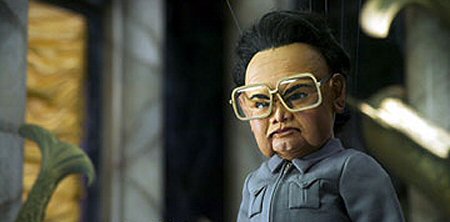
In a movie like Team America, there’s no such thing as just plain hah-hah funny. It’s all about the sub-currents, and the message here is that these liberal snobs aren’t worth listening to, and therefore everything they’ve said about Bush being wrong and arrogant on Iraq is probably suspect. You can throw ’em all out with the trash, the film says. Moore is a lunatic, Baldwin is deranged, Robbins’ complaints about Clear Channel are deluded, Garafalo’s rants on Air America radio are hot air, etc.
Stone told the New York Post‘s Megan Lehmann, “We diss on people like actors who get on a soapbox and say, ‘Let me tell you how it works in Iraq,’ cause they don’t know fucking shit.”
In other words, you can’t have a halfway legitimate opinion about Iraq if you’re a leftie actor, because all you really know is what you’ve read in newspapers, magazines, books and the internet…which isn’t good enough. You have to work for the government or a think tank, or better yet you need to go over to the Middle East and absorb what’s going on first-hand.
But not like what Sean Penn did when he went to Iraq because he’s one of those leftie wack-jobs. To really know what you’re talking about you have to join the military or be a U.S. Senator or work for the CIA or Halliburton.
Maybe Matt and Trey know something we don’t. Maybe Tim, Sean, Michael, Janeane, Alec and the rest of them really are clueless assholes. They probably know them a lot better than I do, so maybe I should shut up.
But I’ll bet Stone and Parker will never accuse actor Ron Silver, a “9/11 Republican” who’s been praising Bush’s record on the news channels, of not knowing what he’s talking about. And he’s just another SAG member getting his information from the same sources.
Could any of this have something to do with E Online‘s Emily Farache, who interviewed Stone and Parker in early ’01 over their Comedy Central series That’s My Bush!, and reported that “they’re both Republicans” and that they “don’t plan on ridiculing Bush” in their then-upcoming series?
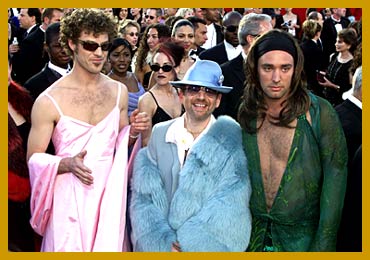
“What we’re trying to do is way more subversive,” Parker told Farache. “We’re going to make you love this guy.”
Or a story by Brit Hume on the Fox News site that ran in December ’01, in which it was reported that Stone and Parker had announced at a People for the American Way fundraiser “that they were Republicans. `It’s true,’ said Parker, who was wearing a stars and stripes outfit.”
Some people have written in and said I’m taking their comments too literally, and that they might have been putting everyone on when they said they’re Republicans. As if.
In a just-posted interview with the Guardian‘s Heather Havrilesky, Parker summed up the film’s political philosophy. To understand his meaning, understand that “dicks” means law-enforcers or international cops (i.e., U.S. forces in Iraq) and “pussies” means Hollywood liberals. Here it is:
“Dicks are bad, and it sucks to be a dick, but it’s way worse to be an asshole, and because there are assholes, we need dicks. So shut the fuck up, all you pussies!”
Guarded Guy
I think all of us felt pretty sad about Chris Reeve’s death. Especially given his image as a kind of never-say-die spiritual hero.
There’s no question in my mind that his life as an impassioned quadraplegic and stem-cell-research advocate made a much greater impression than his performances ever did. I enjoyed his acting from time to time, but I was in awe of who he became after that tragic horse-jumping accident paralyzed him in ’95.
Reeve had a ten-year run (’78 to ’88) as a marquee name. Superman got him off the ground; Switching Channels finished him off. His best film performances were in Jeannot Szwarc’s Somewhere in Time (’80), Sidney Lumet’s Deathtrap (’82) and James Ivory’s The Bostonians.
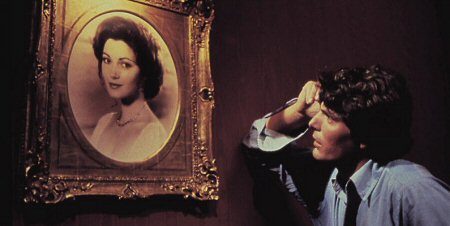
His best performance ever was in the Broadway stage production of Lanford Wilson’s The Fifth of July, in which he played a gay paraplegic Vietnam veteran. It ran in the late summer or fall of 1980. Jeff Daniels and Susie Kurtz co-starred.
I had an experience with Reeve in 1980, when I was a pup journalist living in New York. It began with an interview piece I wrote about him for a New Jersey weekly called The Aquarian, the main subject being Somewhere in Time.
Reeve and I met for the interview at a restaurant on upper Columbus Avenue. I had done my homework and prepared a lot of deep-focus questions, and I think he enjoyed our talk. Sonia Moskowitz, a gifted photographer whom I was seeing at the time, sat in for the interview and then took some photos of Reeve (plus one of him and me) outside the restaurant. Then we went back inside to sort out the bill.
I was a bit green back then, but I’d done a few celebrity interviews and knew that the basic rule was that the studio always picked up the tab. I assumed this would be the case but there was no Universal publicist at the restaurant to cover the check, and I didn’t know what to do because my Aquarian editor had never talked to me about expenses, and I didn’t have the cash to cover it on my own.
I thought Reeve (wealthy actor, right?) might step up to the plate and get his money back from Universal. It was that or somebody would have to leave a personal check or wash dishes. Talk about embarrassing. When I told Reeve I was a bit light I could see he was irritated. We kind of hemmed and hawed about it on the sidewalk, I offered everything I had (about $15 bucks), and he finally dug out his wallet and said, “Well, all right” and paid the balance.
When I wrote my piece I threw in a couple of graphs at the end about this bill-paying snafu. I thought it was both amusing and humanizing on some level that a successful big-name actor who’d played Superman was capable of getting flustered about paying a check, just like anyone else.
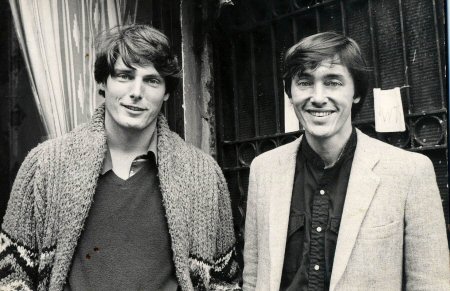
A week or two later, just as the Aquarian piece came out, I went with a couple of friends to see Reeve in The Fifth of July. We visited his dressing room to say hello after the show, and as an ice-breaker I asked if he’d seen the article. Bad question. Reeve hadn’t liked my closer and said so. He was scowling at me. I felt like I was suddenly in the Twilight Zone. I thought I’d written about the restaurant-tab thing with humor and affection. I’d figured this plus the fact that the overall piece was highly flattering would have charmed him.
To soothe things over I wrote him a note the next day saying I was sorry he had that reaction, that I really thought the humor I got out of our check-paying episode made it a warmer, fuller piece, and that I hoped he wouldn’t hold a grudge.
A few weeks later I ran into Reeve at an invitational party at a Studio 54-like roller skating joint in Chelsea. As soon as he spotted me he came right over, smiling, and said, “Hey, Jeff. Got your note…everything’s cool…don’t worry about it.” We shook hands, he smiled again and said “peace,” and that was that.
What this told me about Reeve is that he was gracious, obviously, and able to handle embarassments and whatnot. It also told me that deep down he was into dignity and protocol and doing things a certain way. I think that attitude bled into his acting on a certain level, and that’s why he wasn’t quite Marlon Brando.
Let There Be Sound
My writing skills are more precise than my verbal skills, to judge by this sound file. But I decided to just throw this in as a way of explaining what I’d like to do henceforth, which is turn Hollywood Elsewhere, or a portion of it rather, into an occasional sound-clip thing.
I’ve always wanted to do radio, I’m fairly loquacious, I have a decent-sounding voice and I like trying new stuff. So let’s see what happens. It makes sense to do this. Everyone’s computer has sound these days — we’re not living in 1998 or ’99 — and it’s easy to record a digital segment and throw it in to the column as a link.
I’ll probably start doing this next week. My speaking style will sharpen up after a while and I’ll get rolling with the whole thing and the segments will eventually be interesting.
Sideways Guys
I’ve seen Sideways three and a half times, and it’s gotten better with every viewing. It’s my favorite movie of the year now, enjoying a slight edge over Collateral, Touching the Void and The Motorcycle Diaries.
The halfer happened Monday night at a screening for the Broadcast Film Critics Association that was sponsored by Movie City News. I knew I’d be seeing it again at the Sideways premiere on Tuesday evening (10.12), and I mainly wanted to listen to the q & a screening between Sideways director-co-writer Alexander Payne and his writing partner Jim Taylor.
Movie City News editor David Poland handled the interviewing and question-fielding with his usual aplomb. I’ve since read that the session went on for just over an hour; it felt like half that.
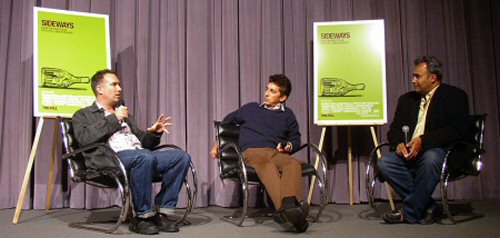
I raised my hand and passed along a comment from an agent friend of mine. She said she didn’t believe that Virginia Madsen would hook up with a guy like Paul Giamatti, which is what happens in the film. Her point was that Madsen is too brainy, busty, beautiful and rich of spirit to pay any mind to a glum and pudgy neurotic.
I told Payne that I think her view is short-sighted, but I wanted to pass along his own response, and here it is: “I think your friend is kind of shallow. I mean, she sounds so L.A.”
I spoke to Payne last night at the after-screening reception. He said he’s working with Taylor on something new, but plans on taking some time off after he finishes promotional duties for the film.
Payne said he’s particularly looking forward to visiting Greece in a few weeks time and attending the 45th International Thessaloniki Festival, which runs from 11.19 through 11.28. (Payne is of Greek ancestry — the IMDB says his birth name was Alexander Papadopoulos.)
The official website says the Thessaloniki festival “assumed its present dynamic internatrional character in 1992, under the direction of Michel Demopoulos.” The site features a quote from Bernardo Bertolucci that says Demopoulos has brought in “a new vitality, opening [the festival] up to a young audience.”
Major filmmaker attenders have included Istvan Szabo, Ivan Passer, Goran Paskalijevic, David Thewlis, Dean Tavoularis, Bernardo Bertolucci and Jerzy Skolimowski. Hey, Demopoulos….do you ever fly in columnists?
Nairobi, Part 2
“It was a nice surprise to see my e-mail posted on the site last week, with a great picture of Nairobi no less.
“Though you might be tempted to think that those giraffes were doctored into the photo of the Nairobi skyline, it is actually possible to see such a view without the aid of PhotoShop.
“The picture must have been taken at Nairobi National Park, which is on the outskirts of town and boasts plenty of giraffes, zebra, gazelles, ostrich and a few rhinos and lions within view of downtown Nairobi’s skyscrapers. Since we get resident rates on park admission ($5 versus the $15 to $30 the tourists pay to get in), my wife and I sometimes bring a picnic blanket and a bottle of wine (South African, of course) to NNP and watch the sun go down as giraffes amble by. A real hardship post, Kenya.

“Kenya’s natural beauty, mix of cultures and ample wildlife have made it a prime location for Hollywood movies about Africa. Ralph Fiennes and Fernando Meirelles were in town a few months ago filming John Le Carre’s The Constant Gardener. Some people I know saw Fiennes in the bar of the Serena Hotel, and a friend-of-a-friend white Kenyan journalist reportedly had dinner with him.
“I’m waiting patiently for the arrival of Nicole Kidman, who is supposed to be starring in Tony Scott’s adaptation of Emma’s War, a non-fiction book about a British aid worker who married a Sudanese warlord. I heard somewhere that the filming of this movie (much of which takes place in Nairobi) has been delayed by the crisis in Darfur. Scott is apparently determined to film in the Sudan.
“Incidentally, Kidman’s character, Emma McCune, was killed in a collision with a matatu (minibus taxi) about a block from where I live. Oops…spoiler.
“The most famous movie filmed in Kenya is, of course, Sydney Pollack’s Out of Africa, based on the life of Karen Blixen, the Danish baroness who “hahd a faaaahm in Aaahfrica.” In her honor, the southeast side of Nairobi, where white farmers and corrupt government officials still own huge pieces of land, is still called Karen. You can tour her former house there. At first glance it looks exquisitely preserved from the colonial days, until you learn that Karen took almost everything she owned back to Denmark with her and that much of the furniture and decorations now filling the house were made for the movie.
“You can also take a hike in the nearby Ngong Hills and linger at Denys Finch-Hatton’s grave, and also contemplate why Robert Redford didn’t at least attempt a British accent.
“An hour outside of Nairobi you can visit Lake Naivasha, another prime filming location. The arabesque Djinn Palace, site of several gauzy debauchery scenes in White Mischief, is still there. You can see it from a boat on the lake when you take a hippo tour, though the mansion now belongs to a Dutch flower magnate and is not open to the public.
“My favorite place to stay at Naivasha is Elsamere, the former lakeside home of George and Joy Adamson, who were the subjects of the old Disney flick Born Free. (the management keeps a scratchy VHS copy at the ready for anyone who wants a screening). Joy, a painter and nurturer of orphaned lions and leopards, was not the prim, bland British babe of the movie but a feisty and abrasive Austrian whose third husband was George, a game warden in Kenya.
“Both Joy and George were murdered — George by Somali poachers and Joy by a
disgruntled servant. The movie, which was a huge hit in its time (just try to get that song out of your head), now looks pretty dated and the production values are pretty embarrassing even by 1960s standards. (Pauline Kael body-slams the movie in her book “Kiss Kiss Bang Bang”).
“One of the funniest things is that whenever the Adamson’s go on safari, none of the animals are just standing there peacefully grazing. Every shot is a wild stampede of elephants, gazelles, zebras, etc., as if a production assistant had fired an assault rifle in the air just before the cameras started rolling.
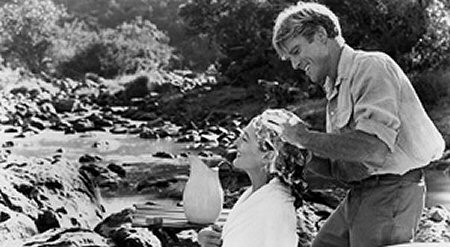
“Up in the Kikuyu highlands near Mount Kenya, you can see where the recent Oscar- winner Nowhere in Africa was filmed. You can also have a drink in the severed-head festooned bar of the Mount Kenya Safari Club, which was founded by William Holden and some of his Hollywood pals so they would have a place to shoot the shit after bagging big game. At least one of the old Tarzan movies was filmed nearby.
“It has recently become vogue for Hollywood producers to throw a few Maasai warriors from Kenya into action flicks to signify `darkest Africa,’ to the extent that one East African journalist recently referred to the Maasai as `the Red Indians of today’s Hollywood adventure movies.’ The most recent example is Tomb Raider 2, partially filmed in Kenya and featuring Djimon Hounsou as an unusually buff Maasai.
“Why are most movies set in Africa pretty bad? Probably because the Africans never get to tell their own stories. I’m hard-pressed to think of more than a couple of Western-produced movies set in Africa (Lumumba, Sarafina, The Gods Must Be Crazy) where the African experience is not filtered through the persective of the Sensitive White Actor to whom the Africans are little more than tragic victims or trusty servants — in other words, reflections of the white man’s own nobility.
“Maybe someday Africans will have a global film industry of their own and more realistic African characters will appear on screen. Nigeria (or Nollywood, to Africans) cranks out nearly as many films in a year as Hong Kong or India, but they are universally crap. And yet that country did produce Chiwetel Ejiofor, so maybe there’s hope.” — Peter Mackenzie, Nairobi, Kenya.
